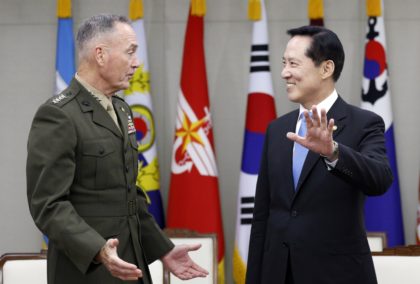
SEOUL—Gen. Joe Dunford, chairman of the U.S. Joint Chiefs of Staff, said the U.S. must take threats from North Korea seriously, despite fresh skepticism from South Korea that Pyongyang has the ability to reliably deliver an intercontinental ballistic missile to the U.S.
“I honestly think it’s an academic issue whether it can happen today or happen tomorrow,” Gen. Dunford told reporters Monday in Seoul after wrapping up meetings with South Korea’s president and other defense officials.
Nuclear Tests
Gen. Dunford noted that North Korea had conducted missile and nuclear tests “at a historic rate”—at least 15 tests in the past year.But uncertainty remains about the North’s ability to endanger the American homeland or even the U.S. territory of Guam, which North Korea threatened last week with an “enveloping fire” of intermediate-range missiles.Those doubts were underscored Sunday by a senior South Korean defense official, who said that both Seoul and Washington had concluded Pyongyang lacks the missile re-entry technology to successfully launch an intercontinental ballistic missile at the continental U.S.
Voice of Sceptisism
The remarks by Suh Choo-suk, Seoul’s vice defense minister, during an interview with Korea Broadcasting System, added another voice of skepticism about whether North Korea has attained a critical capability central to his missile ambitions.In order for a long-range nuclear missile to reach the continental U.S., the missile would exit the earth’s atmosphere, and the warhead would have to be able to survive the punishing journey back through the atmosphere.
“Both the United States and South Korea do not believe North Korea has yet completely gained re-entry technology in material engineering terms,” Mr. Suh said.
“We don’t feel they’ve reached that point yet, but it’s true that they are approaching it,” he added. “We can’t pinpoint the exact timing, but it will take at least one to two more years.”Gen. Dunford declined Monday to comment on what Mr. Suh said.
The assessment wouldn’t affect the North’s threats to lob missiles at Guam, which is animating current tensions, because targeting the Western Pacific island wouldn’t require an ICBM that requires re-entry technology.




